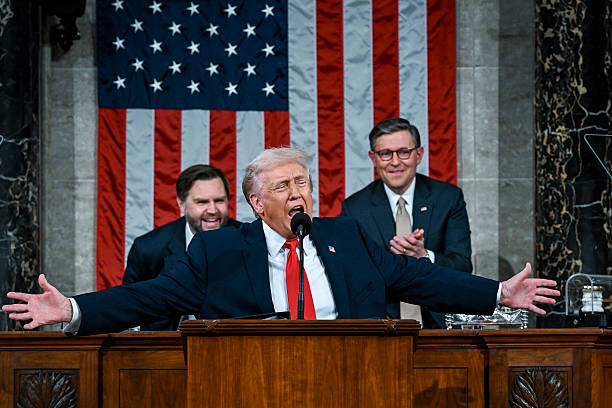(ThyBlackMan.com) In an article this week, headlined “Lindsey Graham, the uninvited guest,”Ann Coulter asks, “Why does Lindsey Graham have a seat at the table on immigration?” The answer has to be, because Donald Trump helped to credential him.
Sen. Graham was a member of the so-called “Gang of 8,” whose approach to immigration then private citizen Donald Trump supported, with campaign contributions to some of its members. This was before he developed the strident anti-immigration, pro-border control stance he boisterously conveyed to win the last presidential election. In light of Sen. Graham’s “Gang of 8” affinities, Coulter rightly faults Graham for having “negotiated a voluntary surrender for the GOP on immigration.” But she conveniently fails to mention private citizen Trump’s affinity for members of the Gang of 8. She seems to assume that President Trump’s loyal deployment of the “big, beautiful wall” meme justifies total amnesia with respect to his previous activities.
During the 2016 presidential campaign, Sen. Graham quite publicly refused to join others in returning Trump’s contribution to his  Senate campaign fund. Apparently, Graham lives comfortably with the fact that he is beholden to Donald Trump. But Americans who remember it have to entertain the possibility that their differences at the moment may ultimately prove to be a kind of mock combat – carefully choreographed steps in a dance that allows a foregone conclusion – i.e., a result that channels the spirit of the “Gang of 8” approach. The key to conjuring this spirit is not, as some would have it, an agreement that makes provision for relief for the so-called “Dreamers” as well as the “big, beautiful wall.” Rather it’s the willingness to pretend that any provision of law can achieve these results simultaneously.
Senate campaign fund. Apparently, Graham lives comfortably with the fact that he is beholden to Donald Trump. But Americans who remember it have to entertain the possibility that their differences at the moment may ultimately prove to be a kind of mock combat – carefully choreographed steps in a dance that allows a foregone conclusion – i.e., a result that channels the spirit of the “Gang of 8” approach. The key to conjuring this spirit is not, as some would have it, an agreement that makes provision for relief for the so-called “Dreamers” as well as the “big, beautiful wall.” Rather it’s the willingness to pretend that any provision of law can achieve these results simultaneously.
Even if the “big, beautiful wall” meme was an entirely appropriate description of what it takes physically to control our borders, it will take at least several years to build. In fact, as President Trump has himself occasionally clarified, border control in the 21st century requires something more sophisticated than just a bricks and mortar barrier, such as the Great Wall of China. It involves blending effective physical barriers and electronic technological innovations with the development of a border security military/police command that, like our Coast Guard, reflects the diverse but inextricable police and military challenges of border security.
Unlike the Great Wall of China, it won’t take centuries to achieve the result, but it will take a politically challenging concentration of effort and resources. It will still be going on when voters have to decide whether or not Donald Trump gets re-elected. Even without a formal waiver provision, we must expect that, like moving the U.S. Embassy in Israel to Jerusalem, there is likely to be “many a slip twixt the cup and the lip,” for logistical, budgetary and political reasons.
Just because a law authorizes a concrete result, that doesn’t mean it magically appears. In fact, since the illegal status of this or that individual or group is just a matter of law, a provision of law can readily change that status. Yet for morally prudential reasons, it is inadvisable to give the impression of immediate relief while leaving its supposed beneficiaries lost in some bureaucratic maze. As Macbeth says in the Shakespeare play, “when ’tis done, then ’twere well it were done quickly.”
This is also a political consideration. If 2020 rolls around with the “big, beautiful wall” nowhere near the launch pad, and a population of illegal immigrants tantalized by a promised change of status not yet delivered, whoever wins the lottery of perceived responsibility for that result will face an electoral nightmare. The voters who see immigration as an issue of moral justice will be angry. The voters who see our lack of border control as the existential threat it truly is, will be feel outraged, and suspect betrayal.
But what if concrete progress on the deployment of the promised border control measures determines the pace at which changes in illegal status actually takes place? Complete X percent of the border control measures, and X percent of the tranche of illegal immigrants covered by the law (say the so-called “Dreamers”) residing in the United States can be processed for a change of status. Tie this requirement to a provision that allows for speedier status relief for illegal immigrants who qualify but choose to leave the U.S. and apply for a change of status from their country of (parental) origin.
Though it has somewhat fallen out of focus, the failure to enforce our immigration laws represents a crisis of sovereignty that has always been a matter of priorities. When he was driven primarily by his own economic considerations, private citizen Donald Trump may have been most concerned with the availability of cheap labor. To attain the presidency, he gave priority to border control. Isn’t the latter the primordial public policy imperative? But this needn’t be an either/or proposition, even given the fact that the perpetuation of our constitutional form of self-government dictates giving it priority.
President Trump approaches the truth when he says that a nation without borders is not a nation. For a people that cannot control its border imperils its identity as a people. And a people unable to enforce laws made pursuant to its own constitutional authority has already surrendered its self-government. But according to our American creed, self-government is also a moral imperative. Many people who desire to come to America as immigrants are, in fact, attracted by our respect for that imperative. It promises dignity and self-respect to all who are willing to abide by the premises of God-endowed equality, justice and rights that form the grounds for our self-government.
We need an approach to immigration that reflects this truth by demonstrating our competent sovereignty as a people. Without that, the promise of human dignity we supposedly offer becomes a lie. Border security and prudently managed immigration are proper goals for America – including provisions, consistent with our domestic peace, order and prosperity – for regularizing the status of otherwise upright illegal immigrants. But President Trump is right: Border control must come first– as a matter of law, and as a matter of carefully preconcerted fact.
Written by Alan Keyes
Official website; http://loyaltoliberty.com

















Leave a Reply